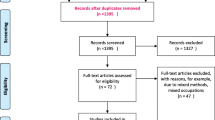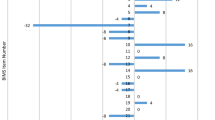Abstract
This study examined how experienced early educators developed as change agents in the context of a leadership development program. Unlike in many other professions, experienced early educators lack opportunities to grow throughout their careers and access the supports they need to lead change in their classrooms, organizations, the profession, and beyond. This qualitative study brings a relational and entrepreneurial leadership theory lens to its analysis of the experiences of 43 early educators as they co-created pathways forward as leaders for change. The study defines leadership as a process of influencing change to improve early care and education, and not reserved just for those with a formal leadership position. Results show how educators came to see themselves as leaders and pursued different paths to making change and driving improvement. The study offers a new conceptual mapping of a leadership development ecosystem for supporting educators’ capacity to identify as leaders as well as lead improvement and innovation. The paper concludes with lessons learned and recommendations for strengthening the leadership infrastructure to support early educator leadership for change and innovation.


Similar content being viewed by others
References
Ancona, D., & Bresman, H. (2007). X-teams: How to build teams that lead, innovate and succeed. Boston: Harvard Business School Publishing.
Berwick, D. M. (1994). Eleven worthy aims for clinical leadership of health system reform. JAMA: The Journal of the American Medical Association, 272(10), 797–802. doi:10.1001/jama.1994.03520100059034.
Bloom, P. J., & Bella, J. (2005). Investment in leadership training-the payoff for early childhood education. Young Children, 60(1), 32–40.
Bryk, A. S., Gomez, L. M., Grunow, A., & LeMahieu, P. G. (2015). Learning to improve: How America’s schools can get better at getting better. Cambridge: Harvard Education Press.
Cameron, C., Mooney, A., & Moss, P. (2002). The child care workforce: current conditions and future directions. Critical Social Policy, 22(4), 572–595.
Carr, V., Johnson, L. J., & Corkwell, C. (2009). Principle-centered leadership in early childhood education. Dimensions of Early Childhood, 37(3), 25–32.
Douglass, A. (2011). Improving family engagement: the organizational context and its influence on partnering with parents in formal child care settings. Early Childhood Research & Practice, 13(2). Retrieved from ecrp.uiuc.edu/v13n2/douglass.html.
Douglass, A. (2014). Resilience in change: Positive perspectives on the dynamics of change in early childhood systems. Journal of Early Childhood Research, 14(2), 211–225. doi:10.1177/1476718x14555704.
Douglass, A., & Gittell, J. (2012). Transforming professionalism: Relational bureaucracy and parent-teacher partnerships in child care settings. Journal of Early Childhood Research, 10(3), 267–281. doi:10.1177/1476718x12442067.
Douglass, A. (2017). Leading for change in early care and education: Cultivating leadership from within. New York: Teachers College Press.
Fletcher, J. K. (1999). Disappearing acts: Gender, power, and relational practice at work. Cambridge: MIT Press.
Fletcher, J. K. (2004). The paradox of postheroic leadership: An essay on gender, power, and transformational change. Leadership Quarterly, 15(5), 647–661.
Gittell, J. H. (2016). Transforming relationships for high performance: The power of relational coordination. Stanford: Stanford University Press.
Gittell, J. H., & Douglass, A. (2012). Relational bureaucracy: Structuring reciprocal relationships into roles. Academy of Management Review, 37(4), 709–733. doi:10.5465/amr.2010.0438
Goffin, S. (2013). Building capacity though an early education leadership academy. Retrieved from http://ceelo.org/wp-content/uploads/2013/12/EELA_Goffin_WEB.pdf.
Goffin, S. G., & Janke, M. (2013). Early childhood education leadership development compendium: A view of the current landscape. (2nd ed.). Washington, DC: Goffin Strategy Group. Retrieved March 1, 2016 from http://www.researchconnections.org/childcare/resources/25544.
Goldstein, L. S. (2007). Embracing pedagogical multiplicity: Examining two teachers’ instructional responses to the changing expectations for kindergarten in U.S. public schools. Journal of Research in Childhood Education, 21(4), 378.
Henderson-Kelly, L., & Pamphilon, B. (2000). Women’s models of leadership in the child care sector. Australian Journal of Early Childhood, 25, 8.
Hess, F. M. (2006). Educational entrepreneurship: Realities, challenges, possibilities. Cambridge: Harvard Education Press.
Institute for Healthcare Improvement. (2003). The Breakthrough Series: IHI’s collaborative model for achieving breakthrough improvement. IHI innovation series white paper. Boston: Institute for Healthcare Improvement; (Available on http://www.IHI.org).
Institute of Medicine and National Research Council. (2012). The early childhood care and education workforce: Challenges and opportunities-A workshop report. Washington, DC: The National Academies Press.
Institute of Medicine and Nation Research Council. (2015). Transforming the workforce for children birth through age 8: A unifying foundation. Washington, DC: The National Academies Press.
Kagan, S. L., & Kauerz, K. (2012). Early childhood systems: Transforming early learning. New York: Teachers College Press.
Komives, S., Lucas, N., & McMahon, T. (2007). Exploring leadership: For college students who want to make a difference. [2nd ed]. San Francisco: Jossey-Bass.
Leonard, J. (2013). Innovation in the schoolhouse: entrepreneurial leadership in education. New York: Rowman & Littlefield Education.
Macfarlane, K., & Lewis, P. (2012). United we stand: seeking cohesive action in early childhood education and care. Contemporary Issues in Early Childhood, 13(1), 63–73.
Miles, M., Huberman, A. M., & Saldaña, J. (2014). Qualitative data analysis: a methods sourcebook. Thousand Oaks: Sage.
Muhr, T. (2004). Atlas. ti: The knowledge workbench: v5. 0 user’s guide and reference. Berlin: Scientific Software Development.
Muijs, D., Aubrey, C., Harris, A., & Briggs, M. (2004). How do they manage? A review of the research on leadership in early childhood. Journal of Early Childhood Research, 2(2), 157–169.
Ospina, S., & Foldy, E. (2010). Building bridges from the margins: The work of leadership in social change organizations. The Leadership Quarterly, 21(2), 292–307. doi:10.1016/j.leaqua.2010.01.008.
Ramgopal, P. S., Dieterle, K. P., Aviles, J., McCreedy, B., & Davis, C. F. (2009). Leadership development in the south: Where do we go from here? Dimensions of Early Childhood, 37(3), 33–38.
Smith, K., & Petersen, J. L. (2006). What is educational entrepreneurship? In F. M. Hess (Ed.), Educational entrepreneurship (pp. 21–44). Cambridge: Harvard Education Press.
Taba, S., Castle, A., Vermeer, M., Hanchett, K., Flores, D., & Caulfield, R. (1999). Lighting the path: Developing leadership in early education. Early Childhood Education Journal, 26(3), 173–177.
Uhl-Bien, M., & Ospina, S. (2012). Advancing relational leadership research: A dialogue among perspectives. Charlotte: Information Age Publishing.
Whitebook, M., Kipnis, F., Sakai, L., & Austin, L. J. E. (2012). Early care and education leadership and management roles: Beyond homes and centers. Early Childhood Research & Practice, 14(1):n1. Retrieved from http://ecrp.uiuc.edu/v14n1/whitebook.html.
Wise, V., & Wright, T. (2012). Critical absence in the field of educational administration: Framing the (missing) discourse of leadership in early childhood settings. Connexious Project, 7(2), 1–9.
Wood, E., & Bennett, N. (2000). Changing theories, changing practice: exploring early childhood teachers’ professional learning. Teaching and Teacher Education, 16(5–6), 635–647. doi:10.1016/S0742-051X(00)00011-1.
Woodrow, C., & Busch, G. (2008). Repositioning early childhood leadership as action and activism. European Early Childhood Education Research Journal, 16(1), 83–93.
Yin, R. K. (2014). Case study research: Design and methods. New York: Sage.
Funding
Funding was provided by Massachusetts Department of Early Education and Care (Grant No. CTEEC0900ISAEECRTTT0806UMB13A).
Author information
Authors and Affiliations
Corresponding author
Rights and permissions
About this article
Cite this article
Douglass, A. Redefining Leadership: Lessons from an Early Education Leadership Development Initiative. Early Childhood Educ J 46, 387–396 (2018). https://doi.org/10.1007/s10643-017-0871-9
Published:
Issue Date:
DOI: https://doi.org/10.1007/s10643-017-0871-9




